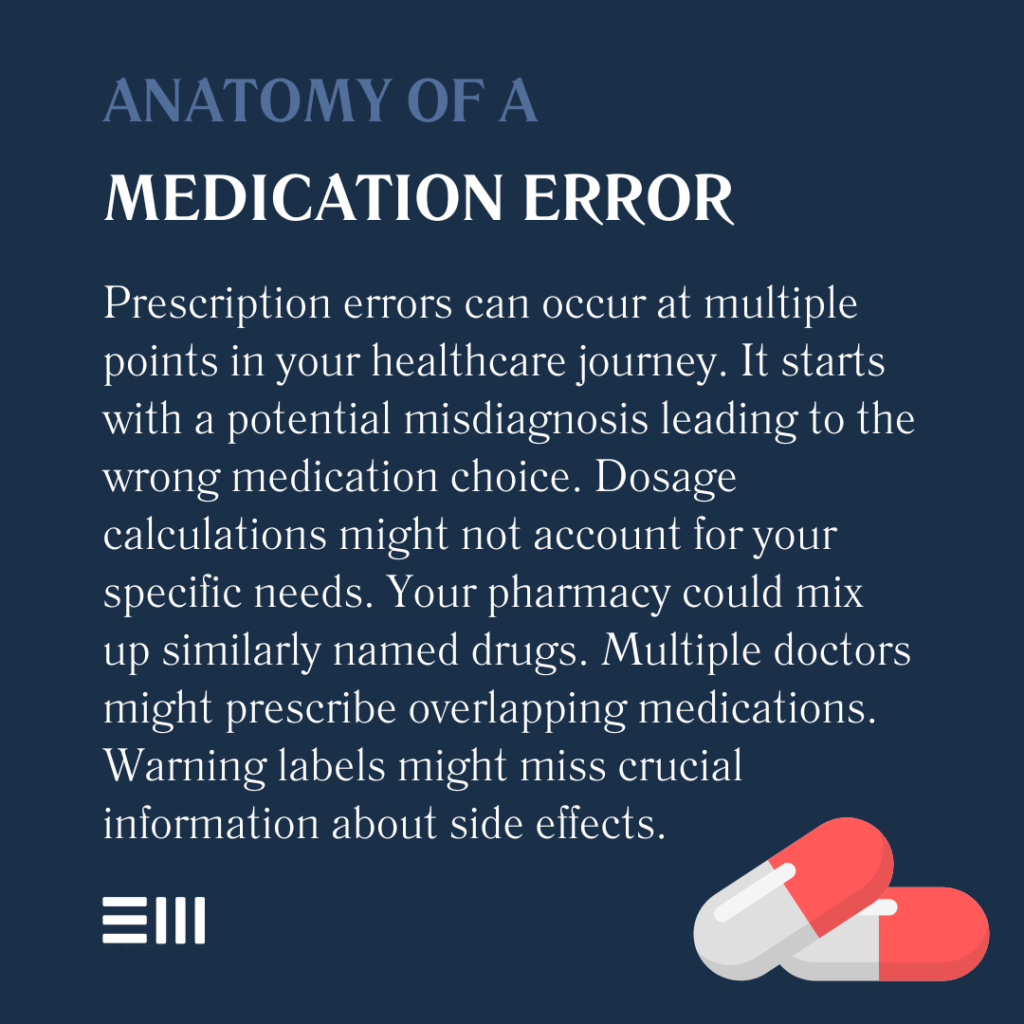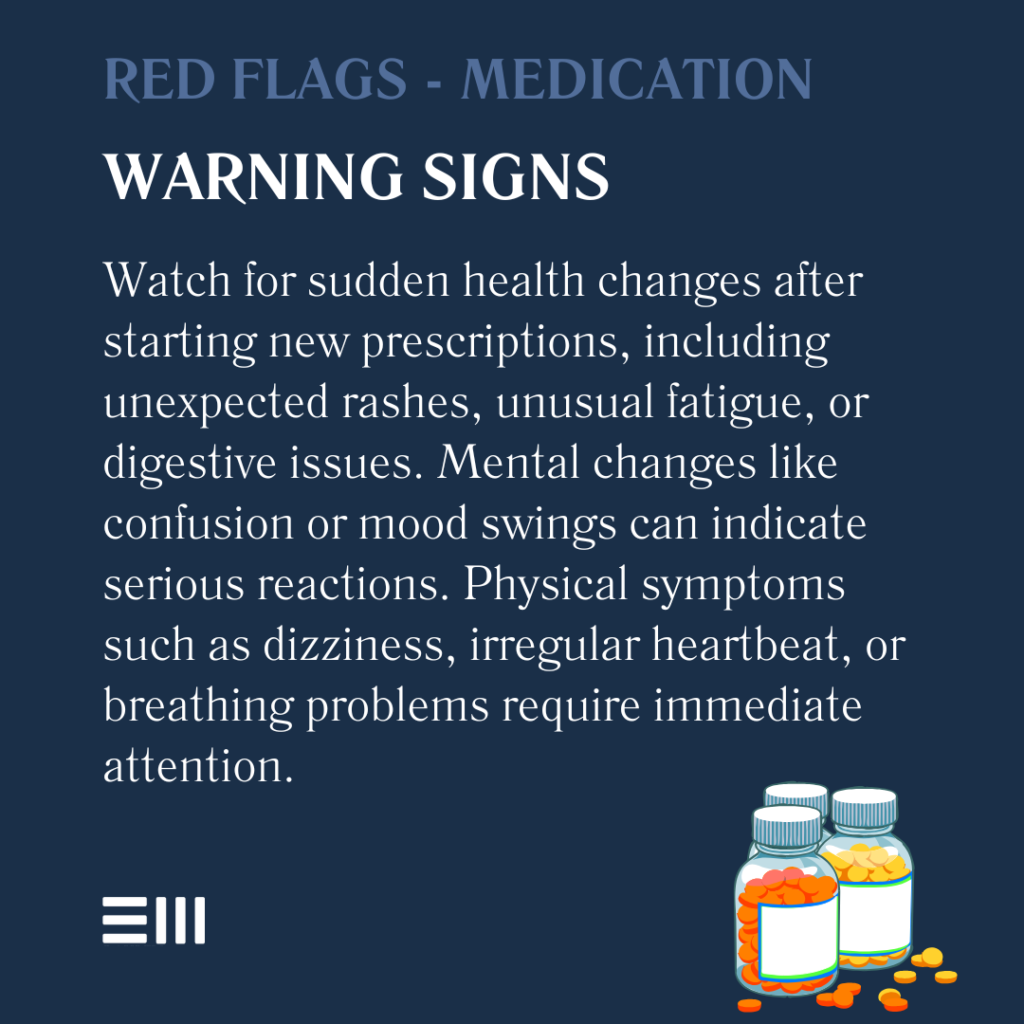
Every 19 minutes, someone in America dies from a prescription drug-related incident. Behind each statistic lies a story of trust placed in our healthcare system—and sometimes, that trust is broken through preventable errors or undisclosed medication risks.
While prescription medications save countless lives each year, the growing complexity of modern pharmaceuticals creates increased opportunities for dangerous errors.
Understanding Medication Errors and Side Effects
Prescription drug safety involves multiple healthcare professionals, from prescribing physicians to dispensing pharmacists.
When any link in this chain fails, the consequences can be devastating.
- Prescription writing errors due to illegible handwriting or unclear instructions;
- Incorrect dosage calculations based on patient weight, age, or kidney function;
- Drug interactions with existing medications or supplements;
- Dispensing mistakes at pharmacies, including wrong medication or strength;
- Inadequate patient monitoring for adverse effects;
- Communication breakdowns between healthcare providers;
- Failure to obtain complete patient medication history;
- Computer entry errors in electronic prescribing systems;
- Confusion between medications with similar names; and
- Improper medication storage affecting drug efficacy.
Understanding these errors helps patients take proactive steps toward safer medication management and recognize when they need to seek help.
Healthcare providers must maintain rigorous safety protocols, but patients also play a crucial role in preventing medication errors.
Common Types of Dangerous Drug Situations
Medical professionals encounter various scenarios where prescription drugs can cause harm. Being aware of these situations helps patients identify potential risks before they become serious problems.
The complexity of modern healthcare systems makes it essential to understand how these dangerous situations develop.
- Incorrect medication prescribed for condition due to misdiagnosis;
- Wrong dosage administration leading to under- or over-treatment;
- Harmful drug interactions with existing medications;
- Failure to monitor patient response to new prescriptions;
- Inadequate warning about side effects and lifestyle modifications;
- Dispensing errors at pharmacies resulting in wrong medication;
- Mislabeled medications causing patient confusion;
- Failure to adjust dosage for patient-specific factors;
- Prescribing contraindicated medications;
- Overlooking patient allergies or sensitivities;
- Medication timing errors affecting drug effectiveness; and
- Duplicate therapy from multiple prescribers.
These situations often arise from systemic issues in healthcare delivery, highlighting the importance of vigilant oversight and patient advocacy.
Healthcare providers must maintain comprehensive medication records and communicate effectively with other providers involved in patient care.

Warning Signs of Adverse Drug Reactions
Recognizing adverse reactions early can prevent severe complications. The body often sends clear signals when medications are causing problems.
Watch for these common indicators that may signal a medication-related problem:
- Unexpected physical reactions like rashes or swelling;
- Sudden changes in health status after starting new medications;
- Unusual fatigue or weakness not explained by other conditions;
- New or worsening symptoms following medication changes;
- Mental status changes including confusion or mood alterations;
- Allergic responses ranging from mild to severe;
- Digestive system problems including nausea or appetite changes;
- Dizziness or balance issues;
- Changes in sleep patterns;
- Irregular heartbeat or blood pressure fluctuations;
- Breathing difficulties;
- Skin color changes;
- Unexplained pain or discomfort; and
- Vision or hearing changes.
Promptly reporting these symptoms to healthcare providers can prevent complications and ensure appropriate intervention.
Keep detailed records of when symptoms appear and their severity to help healthcare providers assess the situation accurately.

Protecting Your Rights After a Medication Error
When medication errors occur, patients have specific legal protections. Understanding these rights helps ensure proper compensation and prevents similar incidents from affecting others.
The healthcare system’s complexity requires careful documentation and prompt action to protect patient interests.
- Document all symptoms and reactions in detail with dates and times;
- Keep detailed medical records including prescription labels and instructions;
- Report adverse events to proper authorities and regulatory bodies;
- Preserve medication bottles and packaging for potential investigation;
- Track all related medical expenses including follow-up care;
- Maintain a timeline of events from prescription to adverse reaction;
- Gather witness statements when possible;
- Photograph any visible reactions or injuries;
- Keep copies of all communication with healthcare providers;
- Record names and roles of all involved medical personnel;
- Document lost work time and income due to medication issues; and
- Save receipts for additional expenses related to the error.
Taking these steps creates a strong foundation for addressing medication-related injuries and seeking appropriate remedies. Legal professionals can use this documentation to build a comprehensive case for compensation.
Preventing Future Medication Errors
Healthcare providers and patients can work together to reduce the risk of dangerous drug situations.
Implementing these preventive measures helps ensure safer medication use:
- Use electronic prescribing systems to eliminate handwriting errors;
- Implement barcode medication administration systems;
- Maintain complete and accurate medication lists;
- Schedule regular medication reviews with healthcare providers;
- Use a single pharmacy for all prescriptions when possible;
- Ask questions about new medications and their potential risks;
- Keep emergency contact information readily available;
- Store medications properly according to instructions;
- Never share prescriptions with others;
- Dispose of expired medications properly;
- Use medication reminders and organizers; and
- Keep a medication diary noting any unusual effects.
These preventive strategies help create multiple layers of safety in medication management. Regular communication with healthcare providers ensures early detection of potential problems.
Frequently Asked Questions About Dangerous Drugs and Medication Errors in Alabama
Patients often have concerns about medication safety and their legal rights.
Here are answers to common questions about dangerous drugs and prescription errors.
What Are the Most Common Types of Prescription Errors?
Common prescription errors include incorrect dosage, wrong medication selection, missed drug interactions, and failure to account for patient allergies.
These errors can occur at any point from prescription to administration and may involve multiple healthcare providers.
How Long Do I Have to File a Claim for a Medication Error?
The statute of limitations varies by state but typically ranges from one to three years from the date of discovery.
Consulting with a legal professional promptly helps preserve your rights and ensures proper documentation of the incident.
What Compensation Can I Receive for a Medication Error?
Compensation may include medical expenses, lost wages, pain and suffering, and ongoing care costs.
Each case is unique, and damages depend on the severity of harm and impact on quality of life. Future medical needs and long-term effects are also considered.
Should I Stop Taking a Medication if I Experience Side Effects?
Never stop prescribed medications without consulting your healthcare provider. Some medications require gradual discontinuation to prevent additional health problems.
Your provider can evaluate symptoms and adjust treatment appropriately.
How Can I Prevent Medication Errors?
Keep an updated list of all medications, communicate with healthcare providers about allergies and reactions, and verify prescriptions before taking them.
Ask questions about new medications and potential interactions. Regular medication reviews with healthcare providers help identify potential problems.
What Should I Do if I Suspect a Medication Error?
Contact your healthcare provider immediately and document all symptoms and circumstances. Seek emergency care if symptoms are severe.
Report the incident to appropriate authorities and consider legal consultation to protect your rights.
Take Action to Protect Your Health and Rights
You deserve answers when medication errors impact your health. Our experienced team understands the complexities of dangerous drug cases and stands ready to help you navigate the path forward.
We provide comprehensive support throughout the legal process while you focus on recovery.Contact us today for a confidential consultation about your situation. Let us help you understand your options and take steps to protect your rights and well-being.
Can't find what you're looking for? Search our site below.










